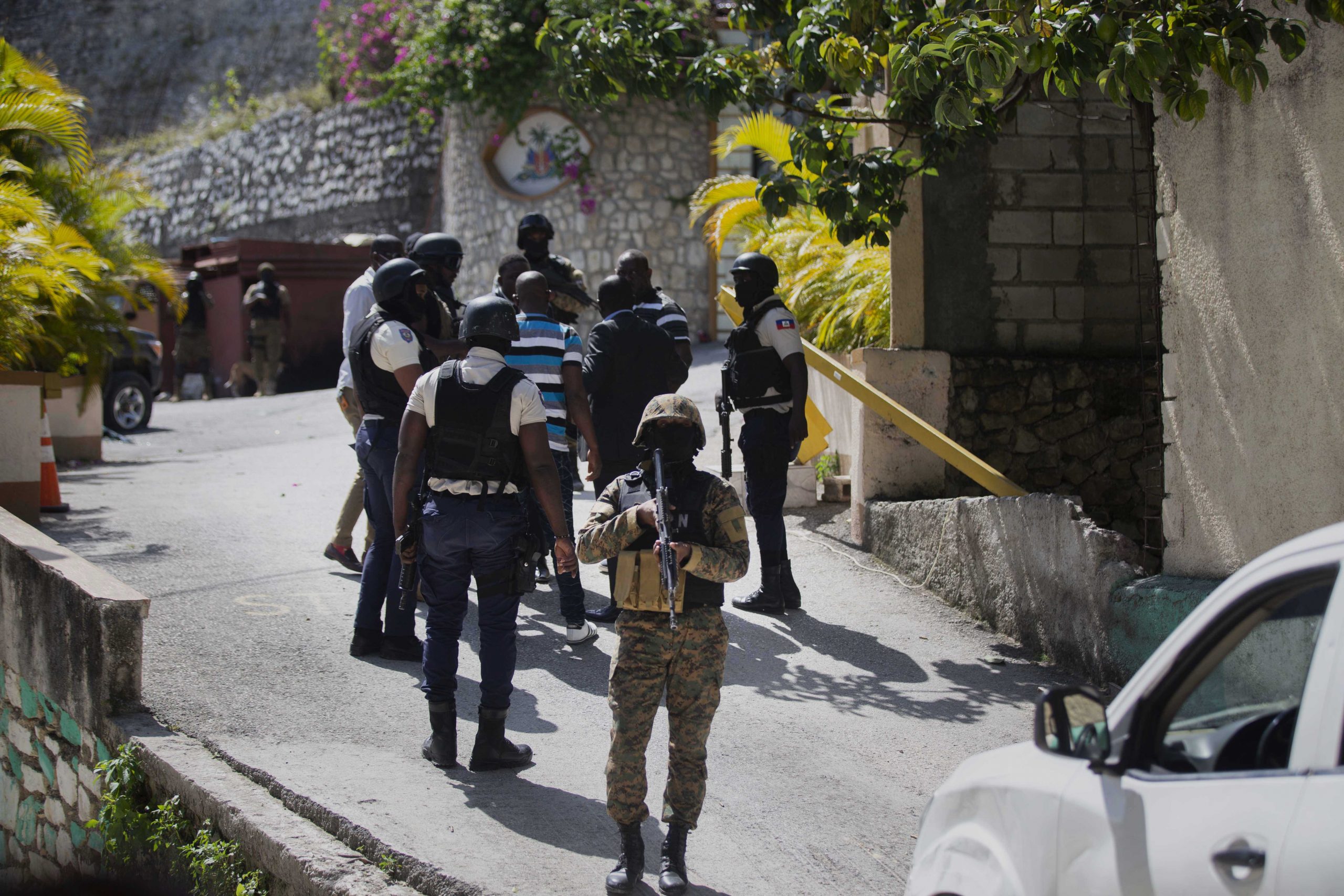Haitian authorities are working hard to determine how and why a group of armed “mercenaries” gunned down 53-year-old President Jovenel Moise at his home on Wednesday. Multiple suspects have been arrested in connection to the assassination, but the identities and motives of the gunman have not yet been fully determined.
Here’s what we know:
What happened?
Moise and his wife, Martine, were both inside their private residence outside of Port-au-Prince when armed intruders fatally shot him around 1 a.m. Wednesday. The first lady, who has since been transported to a hospital in Fort Lauderdale, Florida, for treatment, was critically injured, suffering multiple gunshot wounds to her abdomen and extremities.
One of the mercenaries, as a Haitian official labeled the suspects, reportedly had an American accent and yelled in English, “DEA operation. Everybody, stand down. DEA operation. Everybody, back up. Stand down,” over a megaphone during the attack.
State Department spokesman Ned Price said it was “absolutely false” that DEA agents were involved in the Wednesday attack.
AMERICAN SUSPECTS IN MOISE ASSASSINATION CLAIM THEY WERE TRANSLATORS, OFFICIAL SAYS

Who are the suspects?
Haitian police arrested multiple suspects in connection to the assassination, officials announced Thursday. Two of the suspects are Haitian Americans, while the other 15 assailants in custody are Colombian nationals who appear to be retired members of that country’s military, officials said.
The American suspects have been identified as 35-year-old James Solages and 55-year-old Joseph Vincent. The two said they were working as translators for the assailants and were not in the room when Moise was killed, according to a Haitian judge who interviewed them as part of the investigation into the attack.
Solages and Vincent, who were arrested after a shootout between police and the group of the attackers that killed at least three suspects, were found to be in possession of weapons, clothes, food, and other items used in the assault at the time they were detained, Judge Clement Noel said.
The attackers had been planning their encounter with Moise for over a month but had not planned to kill him, Solages and Vincent said, according to Noel. Instead, they planned to bring him to the national palace, the president’s official residence, they said.
It was Solages who yelled that the group was with the U.S. Drug Enforcement Agency, Noel also said, apparently confirming the earlier account.
Haitian Ambassador to the United States Bocchit Edmond insisted that the assailants, while foreigners, had “internal help” to carry out the attack but offered little in terms of specifics.
“There is no doubt about it. There is some internal help,” Edmond said Thursday, adding, “But the most important thing is we need to continue with the investigations and look and identify those who financed them, those who paid them to commit this horrible act.”
What was the motive?
Authorities have not yet identified a motive, and Edmond declined to speculate about what drove the assailants to kill Moise.
“I just don’t want to speculate on the motive because since there is an investigation going on. I have to wait for the results, but it’s certain that the head of state cannot be killed just for play,” Edmond said. “There has to be a reason.”
Although officials have made no connection to the incident, Moise oversaw the arrest of more than 20 people in February, including two high-ranking officials, whom he accused of plotting to take his life and overtake the government. The president’s critics have maintained that Moise was corrupt for, among other things, seeking a referendum on a draft constitution that would enable him to seek reelection to the presidency.
Who is now in charge, and what is the current political situation?
Haiti is now being led by acting Prime Minister Claude Joseph, who insisted that “democracy and the republic will win” after taking over just months before a scheduled presidential election in September.
“The country’s security situation is under the control of the National Police of Haiti and the Armed Forces of Haiti,” Joseph said.
The country needs military assistance to maintain control, Edmond has said since Moise’s killing, but he declined to say whether the Haitian government would request military assistance from the U.S.
“It is not a decision for me to make,” he said on Wednesday. “It’s between authorities, the U.S. authorities, and the Haitian authorities to discuss and to assess the situation and see where they want to help, how they can help.”
How has the U.S. responded?
President Joe Biden dubbed the situation in Haiti “very worrisome” following the assassination and extended his condolences to the country, while Secretary of State Antony Blinken in a call with Joseph affirmed America’s “continued commitment to work with the Government of Haiti in support of the Haitian people and democratic governance, peace, and security,” his office said in a statement Wednesday.
“Haiti is a partner, and that is how we will treat this relationship,” Price also said this week. “We would echo what we have heard from the acting Prime Minister Claude Joseph in his calls for calm, his calls for the Haitian people to work together to ensure peace, to ensure democratic government. The United States has and will continue to stand by to provide assistance to the Haitian people.”
CLICK HERE TO READ MORE FROM THE WASHINGTON EXAMINER
Beyond that, White House press secretary Jen Psaki revealed on Friday the dispatch of senior officials with the Federal Bureau of Investigation and the Department of Homeland Security to aid the Haitian government ahead of the September elections.
The Washington Examiner reached out to the State Department for comment but did not immediately receive a response.
